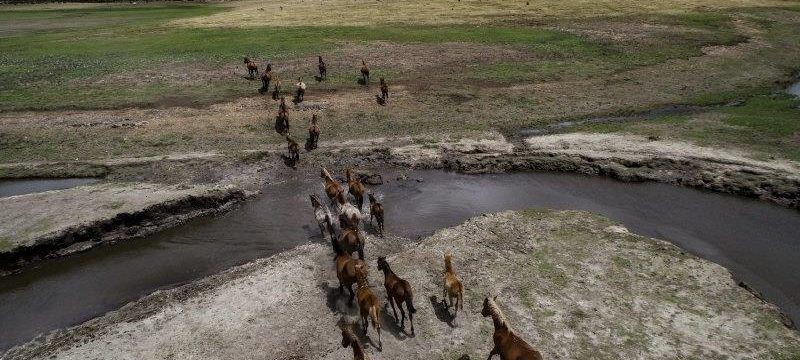A key NSW independent has revealed that it will take a major reduction in feral horses across the Kosciuszko National Park to garner his support in a minority government, in a move likely to stoke tensions within the NSW Coalition.
Wagga Wagga MP Joe McGirr says his condition of support rests on the abolition of the so-called “Barilaro Brumbies Bill” and a significant reduction of the 18,000-strong population in the alpine region, which would probably require ground shooting.
“There’s a romanticism around brumbies, but I don’t think the man from Snowy River would want to see this landscape, the high country, devastated, which is what is happening,” McGirr told the Herald.
The feral horse debate has reared its head again.Credit:Wolter Peeters
Introduced by former deputy premier John Barilaro in 2018, the Kosciuszko Wild Horse Heritage Bill recognises and protects the “heritage value of sustainable wild horse populations” within the Kosciuszko National Park.
Barilaro said brumbies, or feral horses, were part of the “cultural fabric and folklore of the high country”.
Despite the Coalition three years later reaching an agreement to reduce the numbers of feral horses, recent counts suggest the population is instead surging to the detriment of local plants and animals.
Wagga Wagga independent MP Joe McGirr.Credit:Nick Moir
McGirr’s move to outline a list of priorities comes after fellow kingmaker, independent for Sydney Alex Greenwich listed his demands for an incoming minority government, which have already garnered results.
Aside from reducing feral horse numbers, McGirr wants an incoming government to guarantee a regional health minister will be kept in cabinet, and to consider moving the major energy infrastructure project HumeLink underground.
“Repeal the bill and then set some targets around management numbers and start moving actively towards them,” he said.
“There may need to be some on the ground culling, sadly, but the fact of the matter is that we’re at a point where things are beginning to get out of control.”
McGirr insisted he was not calling for the brumby population to be wiped out, and would be happy to see a small population kept in a certain area.
“I think people want this done humanely, but if we don’t do this soon I think actions available to us are going to be narrowed. We need to act now,” he said.
“The current plan is not working, and it’s continuing to wreck the park.”
Figures released by the state government last week show that wild horse numbers have ballooned by 30 per cent in the past two years to more than 18,000. The government says that heavy rain and flooding and a six-week pause in the feral animal shooting have caused a brumby boom.
The government has set itself the challenge of reducing the growing population to 3000 horses by June 30, 2027, However many, including environmental groups and politicians, believe this target will be impossible to reach without increasing management.
In the past three years, the National Parks and Wildlife Service has removed more than 100,000 feral animals. Despite their best efforts, the numbers keep increasing.
Factors like climate change are also likely to aid their numbers. While invasive species flourish in warmer, cooler, wetter or drier surroundings, some native species are struggling to adapt to shifting weather patterns.
Invasive Species Council advocacy manager Jack Gough said he supported McGirr’s position and encouraged others to do the same.
“Every Liberal and National MP I have spoken with has expressed dismay or disappointment about Barilaro’s Brumby Bill, which prioritises invasive feral horses over our native wildlife,” he said.
“Nobody likes killing animals, but the sad reality is that we have a choice to make between urgently reducing the numbers of feral horses or accepting the deaths of our native animals and damage to their habitat.”
Former National Parks Regional Manager for the Snowy Mountains Ross Mckinney, who now guides on commercial horse riding tours in Kosciuszko National Park, said in the 50 years he’d been working, walking and riding in the park, horse populations had exploded.
“I am saddened and angered at the damage I see these horses causing to sensitive natural environments and our water catchments,” he said.
“In the 70s I could drink from any stream I wanted to in Kosciuszko National Park. Now I would never drink from any stream due to the pollution by feral horses.
Get to the heart of what’s happening with climate change and the environment. Our fortnightly Environment newsletter brings you the news, the issues and the solutions. Sign up here.
Most Viewed in Politics
From our partners
Source: Read Full Article


